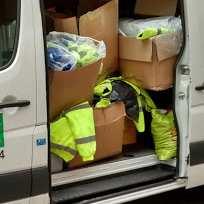How to dispose of 20,000 old uniforms? That was becoming a challenge for a guarding company.
Uniforms designed for security and other FM related duties are not suitable for general wear and so cannot be simply recycled, points out Cordant. Some waste plants were happy to shred the uniforms and recycle the rags but many were not or didn’t have the right facilities so this left the contract firm with a dilemma – how to get rid of 20,000 old uniforms, sustainably? The only options available seemed land-fill or incinerator; or find a better alternative. Given the UK’s landfill problem ,and costs to landfill, the company’s directors saw traditional incineration as a last reesort.
GPT Waste was commissioned to review the company’s supply chain and help find another way of eliminating unrecyclable uniforms. They recommended turning the garments into Refuse Derived Fuel (RDF). This process captures the energy in non-recyclable waste and turns it into bricks or pellets that can be used to replace fossil fuels like coal or oil.
Cordant points to every tonne of waste diverted from landfill eliminating 0.54 tonnes of carbon dioxide equivalent from being emitted in landfill gas; a saving of greenhouse gas emissions.
Edward Macfarlane, Managing Director, Cordant Security, said: “We have processed a total weight of 1,846 kilogrammes to 1.846 tonnes of RDF (based on industry averages). The 1.846 tonnes would produce an approximate 6120k Whr. which is roughly how much energy is needed to power three small houses for a year or generate enough energy to power 55,000 kettles for an hour – that could make a lot of cups of tea! Whichever way you look at it this is a significant output in exchange for our discarded uniforms. By adopting this strategy, the recovery rate is also 100pc or a 100pc diversion from landfill, so our landfill rate is 0pc that is fantastic. It’s far more productive than the other unsustainable alternatives available to us.
“We worked in partnership with GPT waste to analyse the most efficient and practical solutions. We learnt lessons from across the multiple sectors in which we operate. However, we found that the RDF method would be of most use to our own business by supporting our commitment to sustainability. As this solution is also saving us money, it is an all-round win for the business!”
Cordant says it’s now looking at building this project into its general uniform life-cycle programme.










